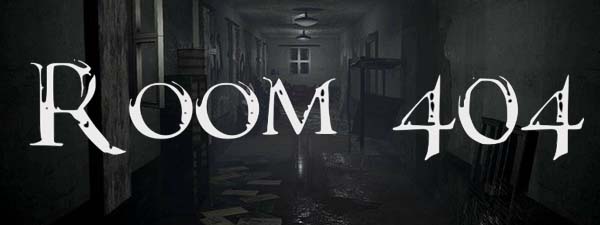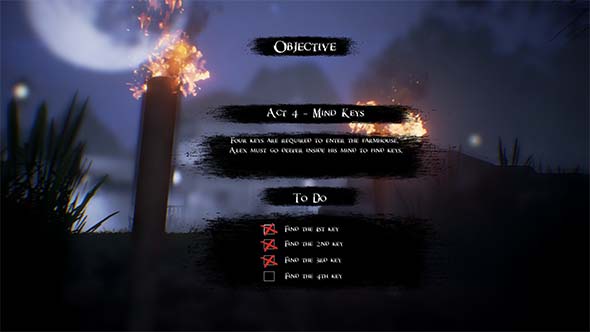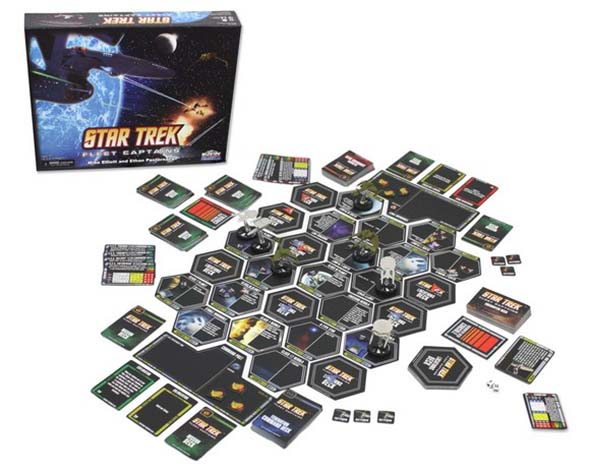
Since I'm in between major releases, it's time for yet another indie Steam game. This time, it'll be a game that was released this year! Only a few weeks ago, in fact! I picked up Room 404 (along with a couple handfuls of other games) in the Steam Summer Sale a couple weeks ago. It's yet another attempt to scratch that horror itch that was left behind by the cancellation of P.T.. Room 404 completely failed to scratch that itch.

Practically the whole game consists of walking around collecting keys. Not very scary...
There's really not much to this game at all. It's only a couple hours long and isn't very mechanically or intellectually substantive. It falls firmly into the category of "walking simulator", and even that might be generous. There's basically three types of puzzles that get re-used throughout the game - if you can call them "puzzles", that is. All of them are resolved by simply exploring the linear areas to find the triggers to solve the puzzle. Numeric keypad locks are opened by searching adjoining hallways and rooms for the numbers that make up the combo, which are hidden in plain sight or in obvious locations. If you're not looking for keypad numbers, then you're looking for simple keys. The second puzzle type involves simply lighting candles in the right order. The final puzzle (which only appears once) puts you in a tiny maze and shows you a map that highlights your current location and the location of the exit. You turn three corners, and you're done.
Some of these puzzles are made a little bit confusing by the game's only real feature: its changing landscape. At several points in the game, you'll come across a locked door or obstacle, which will force you to turn around to find that your environment has changed. In some cases, this will mean that another door will suddenly be open, allowing you to explore a previously-closed off room. In other cases, you simply turn back around to find the obstacles gone. These situations are always accompanied by an audio cue to notify you that something has changed, and the sound of a creaking door will often notify you to go back and check previously-closed doors. In other cases, it's not always obvious what you're supposed to do, and I swear at least a couple puzzles were solved by my simply turning around in circles a couple times wondering what the heck the game wanted me to do.
Puzzles don't get any more complicated than finding keys and numbers hidden in plain sight.
There is an enemy in the game that can kill you on contact, just like in so many other "run and hide" horror games. However, in this case, you can't actually run or hide... [More]
30d421b7-c35e-4626-8f21-2b3bc34eef7d|0|.0
Tags:Room 404, 3DTM, Machine Bear Software, Steam, Steam Greenlight, psychological horror, horror, indie gaming, hotel, murder, father, son

Recently, I brainstormed the possibility of redesigning Beyond Earth's winstates in order to support cooperative victories. With Civilization VI having been announced last month, I want to take some time to look at some different ways to approach victories in the mainstream Civilization games. Since Civilization III, there have been five victory types that have appeared in every mainstream Civ game:
- the military victory = kill or conquer everyone else
- the science victory = build a space ship to Alpha Centauri
- the culture victory = accumulate the most culture yield (usually through wonders)
- the diplomatic victory = vote for yourself to be leader of the United Nations
- the score victory = if no other victories are met by a certain number of turns, the civ with the highest score wins.
Earlier games had fewer victories (only military and space race), but there have been other victory types as well. Civ III and IV had a victory that simply required the player to occupy a majority of the map's land area and population (which could be achieved via military conquest and/or relatively peaceful expansion). I liked this victory type because it facilitated role-play by allowing me to grow my empire organically without having to feel like I was constantly meta-gaming for one of the other victories - just keep growing by whatever means are necessary or convenient. Civ IV also had a religious victory that required you to convert other players to your religion and then get them to elect you to be Pope or whatever. Civ: Revolution and the board game even included an economic victory in which you must accumulate a certain amount of wealth tokens. This was different than the "economic victory" of Civ V, in which you save up enough money to buy out the alliance of every city state on the turn before a U.N. election.
Civilization IV included a religious victory [LEFT], and the board game includes an economic victory [RIGHT].
These victories are intended to provide a direct path to victory using each of the major fundamental gameplay styles. But are there other methods?... [More]
a7731900-5994-464b-bc32-bb3d6884e093|1|5.0
Tags:Sid Meier's Civilization, Civilization, Civilization V, Civilization VI, victory, military, science, culture, diplomacy, religion, high score, economy, peace, war, cooperation, humanism, humanist, alliance, ideology, space race, United Nations, world wonder, agenda, leaders, Theodore Roosevelt, board game, victory point, Ed Beach, Sean Bean, E3, Settlers of Catan, The Sims 2, Sid Meier's Civilization the Board Game

I started writing this post months ago (back in 2015, I think) - long before I had any inkling of the impending release of Civilization VI. This post may be entirely moot now that Civ VI has been announced, and it seems unlikely to me that Beyond Earth will see further expansions. However, I still want to present these ideas, so I've re-written this post to be less speculative and more retrospective. Even if these ideas aren't fated to be implemented for Beyond Earth, it's still an opportunity to look at a way in which the game could have differentiated itself from Civ V, and they could serve as a template for future Civ titles (maybe even Beyond Earth 2) or for modders. Maybe I'll even mod it in myself if I get time and motivation.
Civilization: Beyond Earth really struggled to separate itself from Civ V. The expansion, Rising Tide takes steps to address this with some of its new gameplay mechanics and revised diplomatic engine. Sadly, these efforts don't really address one of the underlying, fundamental, disconnects that the game has with me:
"One of the things that bothered me about Beyond Earth was the way that the victory conditions create an unnecessary competition between the different civs. Aren't we all just colonists from the same earth who are supposed to be trying not to repeat the mistakes of the past? Aren't we trying to preserve the human race? Without the various civs starting the game with any sort of pre-established ideology or agendas, there's no reason for them to be competing with one another. Without a genuine shared victory, there's also no systems in place to share your colonial success with your fellow colonies. The net effect is that once you've defeated the challenge of taming the planet and [one way or another] eliminating the aliens as a threat to your expansion, then the rest of the game is a competition between civs to be the first to reach any of the [mechanically satisfying and varied, yet intellectually vapid] victory conditions."
- from my Rising Tide review

Heck, why are we competing to begin with?
Despite being mechanically different from Civ V's victory conditions, Beyond Earth still fell into the trap of being fundamentally, unnecessarily tribalistic and competitive. I don't know if this is supposed to be some kind of sad, fatalist message that Firaxis is writing into Beyond Earth: that we are doomed to repeat the mistakes of the past. This isn't Fallout. I hope that Firaxis' designers aren't that cynical, and that it was an unintentional emergent consequence of design.
This may seem like a small, trivial, superficial issue, but it's not. Regular Civilization is easy to buy into because it's based [loosely] on established history and uses real-world characters and states that most people are already familiar with. Buying into the theme of Beyond Earth is just so much harder because there's so much of the game that just doesn't make sense, or which doesn't really follow from the opening cinematic or the game's flavor text. This is why Alpha Centauri went to such great pains to personlize the leaders, and to turn them into charicatures of established real-world ideologies and standard sci-fi tropes. These are factions with established goals and agendas that we can understand, and we can buy into their conflicts. Beyond Earth doesn't have that, and so not only do its leaders fall flat as characters unto their own, but the entire basis upon which the game's core conflicts and victory conditions are based start to fall apart as well.
In any case, I think that one of the best ways that Beyond Earth could have truly separated itself from Civ V (mechanically and thematically) would have been to change the competitive nature of the victories and introduce truly cooperative victories, or maybe even a "players versus map" victory type. And I want to emphasize from the start that I haven't put nearly as much time into Beyond Earth as I have into Civ V. I'm by no means an "expert" in the game. So feel free to take the following suggestions with a grain of salt. I admit that these ideas simply might not work, but I still think that it's worthwhile to explore the possibility space that this game could have offered... [More]
41c56220-e572-46c7-b911-40df5b0b6ab2|1|5.0
Tags:Sid Meier's Civilization, Civilization: Beyond Earth, Civilization: Beyond Earth: Rising Tide, Firaxis, 2K Games, PC, Steam, strategy, grand strategy, turn-based strategy, science fiction, space, victory, cooperation, alliance, harmony, purity, supremacy, contact, first contact, domination, board game, Battlestar Galactica, Pandemic, Arkham Horror, Mansions of Madness, Descent: Journeys in the Dark

Star Trek: Fleet Captains is an exploration and combat board game by WizKids.
Good Star Trek games are few and far between. That goes for both video games and board games. Part of the reason for this is that it's often difficult to capture the spirit of Star Trek when trying to adapt it into en existing game genre. This is why Trek-themed games end up turning into dull shooters or tactical combat games. Games about exploration or scientific discovery, or role-play are sadly uncommon in video game formats (which is what makes 1999's PC game Birth of the Federation stand out to me as an underrated Trek classic). Sure it was just a reskin of Master of Orion II, and it had lots of technical and A.I. flaws, but in a market dominated by cookie-cutter games like Star Trek: Armada, Elite Force, and Invasion, Birth of the Federation was a rare game in which "exploring strange new worlds" and "seeking out new life and new civilizations" was a primary game mechanic.
Board games and table-top games have maybe fared a bit better than video game adaptations. We have our Dungeons & Dragons-inspired role playing games, our tactical starship simulators, and then countless board game reskins (ranging from Monopoly to Settlers of Catan, and virtually everything in between). Most of these games are pretty old, but there's also a handful of newer Star Trek games that run the gamut. One such game is WizKids' Star Trek: Fleet Captains.
WizKids is probably best known for its Mage Knight and Hero Clix miniatures games based on fantasy, video game, and comic book characters. The bases for these figures include a rotating dial that allows the player to change the attributes of the character to one of several pre-set values. This can include altering their combat attack power, hit points, mana, or any other value that the specific game might require. Fleet Captains uses a similar clix system as the backbone of its starship management mechanics.
Unboxing impressions
My first impressions upon opening the box was a bit disappointing. I'm not a big fan of the ship miniatures. They're fairly well-detailed and made out of a sturdy plastic and seem like they should stand up to a lot of play, but that's the only thing that I like about them. They take up a lot of space, making it difficult to cram more than two or three ships on any single hex. There seems to have been some effort made to scale the size of the Federation ships with one another, but it isn't consistent. Voyager, for example, is almost as large as the Enterprise E, but the Enterprise A and Reliant are noticeably smaller and appear decently-scaled against the Galaxy class Venture. Klingon ships, however, seem to have no effort put into trying to appropriately scale them. Birds of Prey and classic cruisers look huge compared to most Federation ships and to other Klingon ships. The Negh'var, despite being one of the largest ships in the game, just doesn't seem as massive and intimidating as it should be.
Despite the manual showing painted miniatures in its components list [LEFT],
the actual miniatures [RIGHT] are unpainted and not to-scale with one another.
The ships are also all are made of the same mono-chrome plastic and are un-painted (even though the instructions appear to show painted miniatures in the components list). These ships are different enough in design that it's really not hard to tell them apart, and so I see no reason why they couldn't have been painted (as opposed to being the same color for ease of recognition)... [More]
b4ed0de9-dad0-40a2-8fb7-fdfa4f9f20d1|2|3.0
Tags:Star Trek, Star Trek: Fleet Captains, starship, board game, miniatures game, Hero Clix, WizKids, victory points, hex, exploration, Mike Elliot, Ethan Pasternack
|

| 12 | | | | | | | 60 | | 11 | | | | | | | 55 | | 10 | | | | | | | 50 | | 09 | | | | | | | 45 | | 08 | | | | | | | 40 | | 07 | | | | | | | 35 | | 06 | | | | | | | 30 | | 05 | | | | | | | 25 | | 04 | | | | | | | 20 | | 03 | | | | | | | 15 | | 02 | | | | | | | 10 | | 01 | | | | | | | 05 |
|